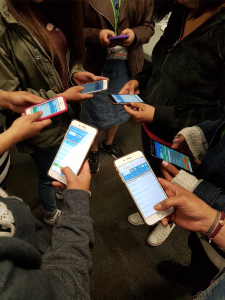
(L-R) Jennifer Reguindin and Dr. Raquel Meyer
Like many innovations in healthcare, the Sensory Observation System (SOS) Checklist App came about after a clinician noticed an issue in practice. “There is room to improve communication in long-term care,” says Jennifer Reguindin, a nurse and interprofessional educator for the Centre for Learning, Research & Innovation in Long-term Care. “I hear staff say, ‘I need your help with a patient’ and it isn’t specific enough. So a typical response would be, ‘I’ll help later.’ This sometimes results in in an unnecessary escalation or uncovers a concern that was already addressed.”

The aim of the SOS app is to offer care providers a common language.
The SOS Checklist App offers care providers a common language they can use with healthcare providers. “Communication accounts for 80 per cent of medical errors,” adds Reguindin. “So here’s a resource that can support communication using a framework. Here’s an easy way if you take the time to pause and think about what you want to say and activate the team accordingly.”
That data includes everything from incremental changes in appetite, self-care abilities and mood changes, among other things. The goal is to offer care providers a common language, a secure space for observable changes to be stored and shared, and potentially reduce unnecessary hospital admissions for seniors.
“I believe that this app can increase the accuracy of patient report in the clinical setting, as well as recognize any acute changes that the patient is experiencing,” shares Anthony Saceda, a newly graduated registered practical nurse who has used the app in practice. “As a new graduate, there will be signs and symptoms that I can possibly miss when assessing my patient,of which can be critical. This app also allows me to explore different possible outcomes that may arise as I assess my patient.”
At first, the SOS app was meant solely for care providers such as nurses and PSWs. However, Reguindin realized its potential benefits to caregivers and is now testing it among people caring for elderly family members.
In addition to financial support, Reguindin says the Baycrest-led Centre for Aging + Brain Health Innovation (CABHI) has provided significant guidance and feedback opportunities. For example, Reguindin participated in a focus group with CABHI’s Seniors Advisory Panel – a diverse group of seniors who meet bi-weekly to share their input on CABHI-related innovations.
Reguindin adds that CABHI’s involvement has been crucial to access business support. “I’m a nurse – how do I learn how to get this app out to people? I don’t know how. With CABHI’s support, someone will be able to coach us on getting the app to market when the time is right.”
Stay tuned to CABHI’s blog for updates on the SOS app.


